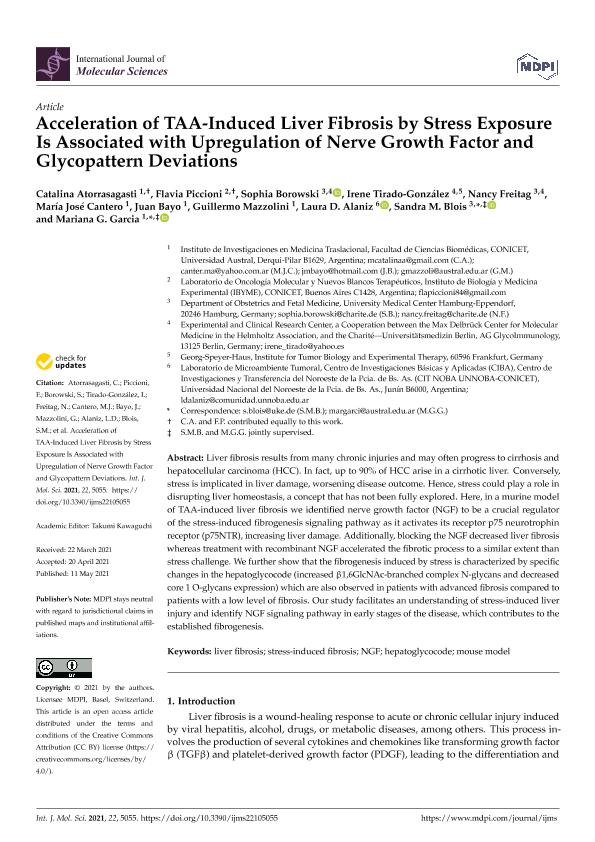Artículo
Acceleration of TAA-Induced liver fibrosis by stress exposure is associated with upregulation of nerve growth factor and glycopattern deviations
Atorrasagasti, María Catalina ; Piccioni, Flavia Valeria
; Piccioni, Flavia Valeria ; Borowski, Sophia; Tirado González, Irene; Freitag, Nancy; Cantero, María José
; Borowski, Sophia; Tirado González, Irene; Freitag, Nancy; Cantero, María José ; Bayo Fina, Juan Miguel
; Bayo Fina, Juan Miguel ; Mazzolini Rizzo, Guillermo Daniel
; Mazzolini Rizzo, Guillermo Daniel ; Alaniz, Laura Daniela
; Alaniz, Laura Daniela ; Blois, Sandra M.; García, Mariana Gabriela
; Blois, Sandra M.; García, Mariana Gabriela
 ; Piccioni, Flavia Valeria
; Piccioni, Flavia Valeria ; Borowski, Sophia; Tirado González, Irene; Freitag, Nancy; Cantero, María José
; Borowski, Sophia; Tirado González, Irene; Freitag, Nancy; Cantero, María José ; Bayo Fina, Juan Miguel
; Bayo Fina, Juan Miguel ; Mazzolini Rizzo, Guillermo Daniel
; Mazzolini Rizzo, Guillermo Daniel ; Alaniz, Laura Daniela
; Alaniz, Laura Daniela ; Blois, Sandra M.; García, Mariana Gabriela
; Blois, Sandra M.; García, Mariana Gabriela
Fecha de publicación:
11/05/2021
Editorial:
Molecular Diversity Preservation International
Revista:
International Journal of Molecular Sciences
e-ISSN:
1422-0067
Idioma:
Inglés
Tipo de recurso:
Artículo publicado
Clasificación temática:
Resumen
Liver fibrosis results from many chronic injuries and may often progress to cirrhosis andhepatocellular carcinoma (HCC). In fact, up to 90% of HCC arise in a cirrhotic liver. Conversely,stress is implicated in liver damage, worsening disease outcome. Hence, stress could play a role indisrupting liver homeostasis, a concept that has not been fully explored. Here, in a murine modelof TAA-induced liver fibrosis we identified nerve growth factor (NGF) to be a crucial regulatorof the stress-induced fibrogenesis signaling pathway as it activates its receptor p75 neurotrophinreceptor (p75NTR), increasing liver damage. Additionally, blocking the NGF decreased liver fibrosiswhereas treatment with recombinant NGF accelerated the fibrotic process to a similar extent thanstress challenge. We further show that the fibrogenesis induced by stress is characterized by specificchanges in the hepatoglycocode (increased β1,6GlcNAc-branched complex N-glycans and decreasedcore 1 O-glycans expression) which are also observed in patients with advanced fibrosis compared topatients with a low level of fibrosis. Our study facilitates an understanding of stress-induced liverinjury and identify NGF signaling pathway in early stages of the disease, which contributes to theestablished fibrogenesis.
Palabras clave:
Liver Fibrosis
,
NGF
,
Hepatoglycode
,
Mouse model
,
Stress induced fibrosis
Archivos asociados
Licencia
Identificadores
Colecciones
Articulos(SEDE CENTRAL)
Articulos de SEDE CENTRAL
Articulos de SEDE CENTRAL
Citación
Atorrasagasti, María Catalina; Piccioni, Flavia Valeria; Borowski, Sophia; Tirado González, Irene; Freitag, Nancy; et al.; Acceleration of TAA-Induced liver fibrosis by stress exposure is associated with upregulation of nerve growth factor and glycopattern deviations; Molecular Diversity Preservation International; International Journal of Molecular Sciences; 22; 10; 11-5-2021; 1-15
Compartir
Altmétricas



